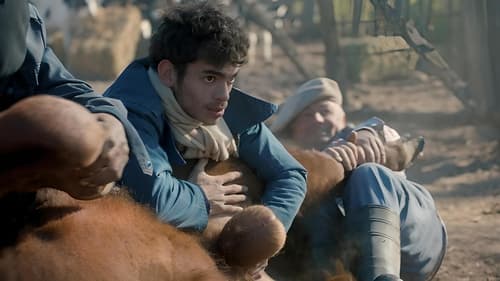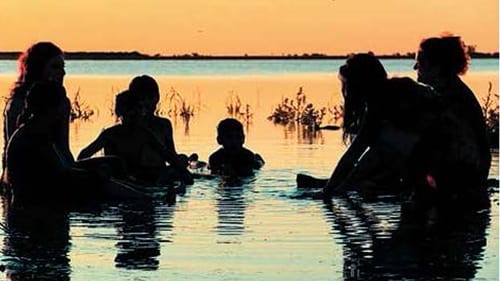Eva Bianco
History
Eva Bianco is an argentinian actress. She lives in Cordoba, Argentina.

An American filmmaker arrives in the Argentinian pampa to film Matadero: a founding narrative of class struggle where a group of laborers slaughter their bosses like cattle. It is 1974, the violent persecution of the left has just begun in Argentina, and the young actors in the film are on the verge of taking a leap into full time clandestine militancy.

After twenty years in Buenos Aires, Clara returns with her husband and daughter to Tierra del Fuego, where she meets her father, with whom she is at odds. Shortly after arriving, she realizes that a pack of dogs is sowing terror.

A stone falls from the sky in a mountain village. Two friends set out to find it in the countryside. On the way they talk, remember a deceased friend, laugh, discuss, meet other seekers. On the way, poetry is read, poetry is heard, poetry is felt in the wind. From the beginning of the day until the light goes out. One or more goodbyes, but also encounters and promises. A film about friendships, winter landscapes and something as useless and necessary as poetry.

Nora
Ramiro is a bar cook. Hernán is an unemployed technician. Nora is a nurse in a public hospital. Lucia sells books in a bookstore. Four stories and a black and white city with persistent rain. None of them know each other, they are only inhabitants of the same city.

Eva
Those who rebel against authority figures disobey. This film echoes “Cordobazo” — a popular rebellion in Cordoba against the Argentine military dictatorship in 1969 — through the story of Alicia, a trolleybus driver who joins an insurrection against an oppressive regime.

Angélica
Ernesto lives with his seven dogs in an apartment building in the city of Córdoba, Argentina. His lonely daily routine revolves around his pets' needs, his health problems and his money problems. His neighbors arrange a mediation hearing and urge him to take his pets out of the apartment. Ernesto does not want to live without his dogs, and he cannot afford to move elsewhere. Thanks to the empathy of people who are also lonely, but every day share common spaces that connect them, Ernesto finds a way to solve the conflict.

Mabel

Sara discovers that agrochemicals sprayed by her neighbor for soy cultivation poisoned her daughter. The treatment compels them to travel to Buenos Aires. To get money for it, Sara devotes herself to drug trafficking. This becomes a threat to her freedom and the safety of her children.

The hypocrites tells the story of Nicolás, a young cameraman who works filming social events, but doesn’t feel fulfilled with his profession. In the middle of a high profile wedding, he accidentally records a compromising situation between the bride, Martina, and her brother, Esteban. Realising about what is in the tape, he sees the opportunity of leaving his tedious life behind through blackmailing the people involved. However, he does not know this secret could endanger his own life.

Magalí
After her mother’s death, Magali returns to her native town in the argentine north. The threatening presence of a puma that eats animals and appears in dreams unsettles the town. Magali’s approaches her son, together they will fulfill the family duty on which depends their own prosperity

Cadana
In the dead of winter, just a few days before her long-awaited wedding, Magda is witness to a series of tragic events that involve her groom. Shocked, she decides to keep quiet, but soon her body will start speaking for her.

A contemporary dance group performs a rehearsal close to the premiere of the work. The existing tension, and enmity in the group, will make them release their violence. After this explosion of blows, they remained calm, as if nothing had happened.

Jackie
Iris' quiet and peaceful life begins to change dramatically when she hosts Maia, her friend's daughter. When Iris realizes that Maia is in love with an older woman, she begins to wonder if she herself might be that woman.

Ana transcribes the news of a crime committed a few nights ago in the city. Surrounded by her colleagues, Ana’s eyes perceive something strange; the killer’s look will be fixed on her.

A film about moments of affection and maternal protection, blurred family ties and labour injustices.

Carla arrives after years of absence to accompany Martina. Relations between them are cold; there's something unspoken between them. Martina slips away for secret meetings with Diego, a man twice her age. The two are involved in a hardcore sex game that's out of control. When Carla discovers the relationship she confronts Diego.

Based on the novel by Argentine poet Juan José Saer, Gustavo Fontán’s beautiful film observes, over the course of a single day, three interrelated families who live around the Parana River. Wenceslao (Germán de Silva of Las acacias and Wild Tales) blames himself for his son’s death six years prior, but attempts to get his still-grieving wife to attend her sister’s New Year’s Eve party; she refuses, even after her nieces and other sisters join in the effort. Throughout, DP Diego Poleri captures the golden-hued radiance of the river during the day as spellbindingly as he does the charcoal-tinted night. -from http://www.filmlinc.org/

Las calles could be regarded as a film about words, about describing and naming, about secrets and confessions, and about language as the matter of memory. In a dialogue between generations, young people are responsible for elaborating the question, and School is the place that tries to come up with a technique for it. In turn, the elderly answer through their stories, which are basically the story of the town. And like the word –which is always a fiction– builds a reality, the film sustains its tone on that intermediate area in which a fictional setting provides the conditions for the pure documentary genre to mark the pace and reach out to people.

Celina
In the company of housewives, professionals and a retired tennis instructor, Hernán is part of a middle-class community that is preparing for the eventual arrival of the end of the world at a holiday resort in the marshy Tigre delta.

Seño Mabi
With the arrival of the apocalypse, four friends decide that they are going to spend the last night of their lives together, fulfilling the ritual that has kept them together for years. Every Thursday they eat a barbecue, NO MATTER WHAT HAPPENS.

Michi, a village tarot reader, has lost his dog Ernesto, between kennels and drunkenness, Michi's wandering daily search to reunite with his pet intersects and confuses the relationship he has with Pepo and Yasu, a young couple, and with Eva, a policewoman who patrols the dirt streets that are the horizon of vernacular geography.

Noe
Three women travel to a distant place to do welfare work. They assist, listen, stay with the unprotected. An old hospital in ruins accommodates them. The imposed group life gets more complex as they start to know each other. The relationship with the others, the community, is also difficult. But, as days go by, they will start to melt into that human landscape surrounding them. To be part of the mystery of otherness.

La mujer
A young man, on his way to a factory to assess its efficiency, causes a car crash. The factory owner, who ran the business with his wife and her brother, has been killed in an accident, though whether it’s the same accident is left unclear. The film explores the unforeseeable ramifications of the twin tragedies.

Mother
Drama about a man who is supposed to kill his daughter.

Feature film

Tatiana
The protagonist is Axel, aged about 40, a doctor who no longer practices his craft. He is living temporarily with his sister and her children. He doesn't do much, just exists a little between the living and their things. One day, he meets a young, pregnant woman. A relationship develops, a kind of love, and they live together, like driftwood temporarily clinging on to each other.






















